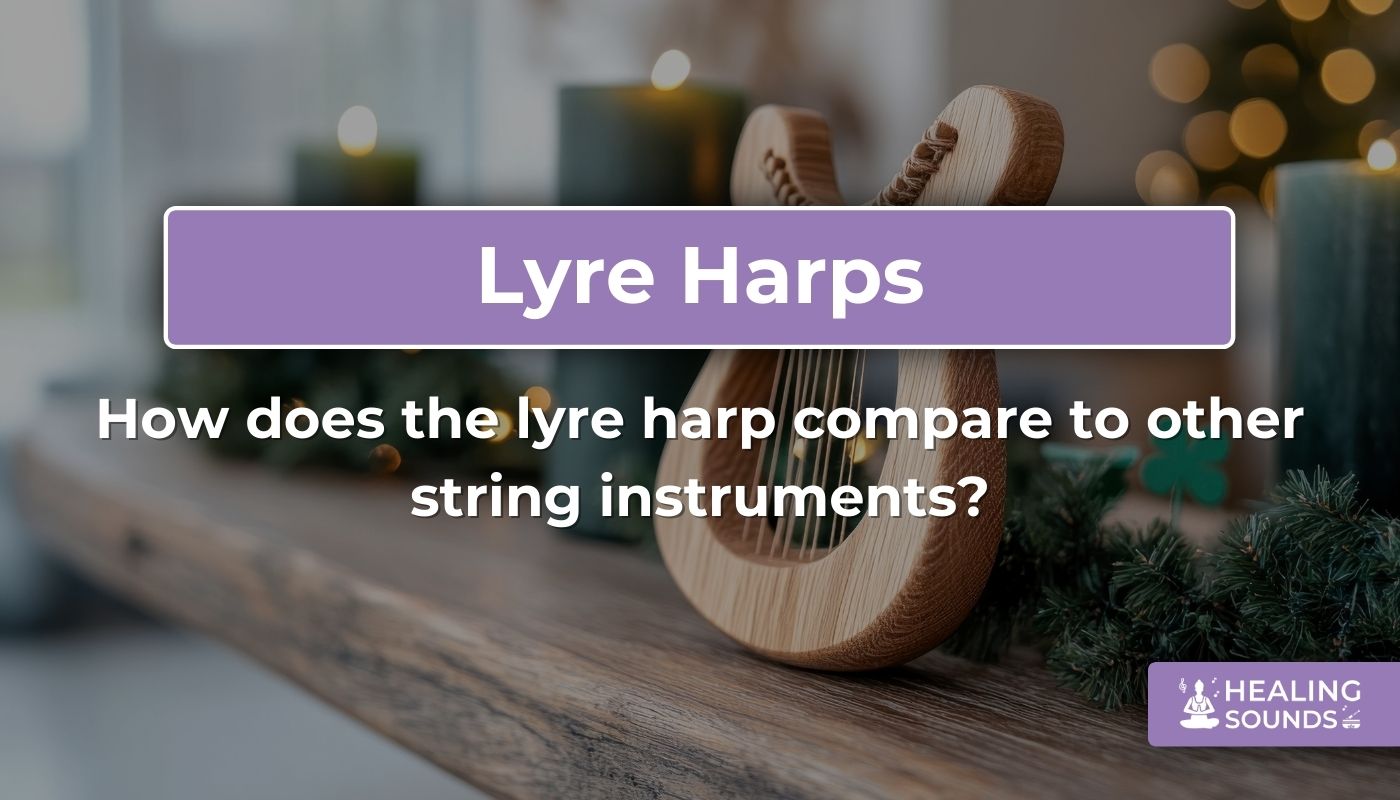The journey into the world of string instruments is captivating, filled with diverse sounds and rich histories. If you're drawn to melodic harmonies for relaxation or personal expression, choosing between a lyre harp vs other string instruments can feel like a significant decision. Why might the ancient charm of the lyre harp resonate more deeply than a guitar or violin, especially if you seek soothing, therapeutic sounds? Understanding the unique qualities of the lyre harp is key.
This guide explores the distinct characteristics of the lyre harp, comparing it thoughtfully with popular instruments like the guitar and violin, and even touching upon its historical cousins like the lute. We'll delve into structure, sound, ease of play, and the unique wellness benefits associated with lyre harp music. By the end, you'll have a clearer picture of whether the lyre harp is the right melodic companion for your musical and healing journey with Healing Sounds.
What Exactly is a Lyre Harp?
The lyre is an ancient instrument, often associated with Greek mythology and evoking images of celestial music. Modern instruments often called "lyre harps" draw inspiration from these ancient lyres. They typically feature strings stretched across an open frame, often with a soundbox, but are distinct from large, complex orchestral harps. The term 'lyre harp' usually refers to these accessible, modern interpretations.
Unlike the concert harp with its pedals and intricate mechanics, the lyre harp generally has fewer strings and a simpler, more portable design. Its sound profile is often described as ethereal, gentle, and soothing – qualities that make it exceptionally suited for relaxation, meditation, and sound therapy practices. This calming resonance is central to its appeal for those exploring healing sounds.
Is a Lyre Harp Good for Beginners?
Absolutely! One of the most significant advantages of the lyre harp, especially compared to instruments like the violin or fretted instruments, is its accessibility for beginners. Its typically open-string design (no frets to navigate) and intuitive playing style (plucking) make it easier to produce pleasing sounds quickly.
The often compact and lightweight nature of lyre harps also makes them less physically demanding to hold and play than larger instruments. This simplicity allows newcomers to focus on the meditative quality of the music rather than getting bogged down in complex techniques, making it an encouraging first step into the world of string instruments.

16-String Lyre Harp Instrument for Beginners
€69.90 €90.90
Unlock the world of music with the Luck Leaf 16-String Lyre Harp, perfectly designed for ease of learning and immediate enjoyment.
Explore This Beginner LyreLyre Harp vs Other String Instruments: Key Differences
Understanding how the lyre harp stacks up against other popular string instruments helps clarify its unique niche, particularly for those interested in its therapeutic potential.
Lyre Harp vs Guitar
When looking at the lyre harp vs guitar, the most obvious difference is the presence of a fretted neck on the guitar. Frets allow for easy changing of pitch on a single string and facilitate chord playing, contributing to the guitar's versatility across many genres.
The lyre harp, typically fretless, relies on individual strings for each note. While this might seem limiting, it contributes to its simpler playing style and distinct, open sound. Guitars offer harmonic complexity and rhythmic drive, whereas lyre harps excel in creating flowing, ambient melodies perfect for relaxation.
Lyre Harp vs Violin
The comparison of lyre harp vs violin highlights differences in sound production and complexity. Violins produce sound via bowing, allowing for sustained notes and expressive dynamics, making them central to orchestral music. However, mastering bowing and intonation on a fretless fingerboard demands significant practice.
The lyre harp is played by plucking, producing a gentler, decaying sound. Its learning curve is generally less steep, and its maintenance is simpler. While the violin offers vast expressive power, the lyre harp provides an accessible route to creating serene, reflective soundscapes.
Lyre Harp vs Lute
Exploring the lyre vs harp vs lute distinction takes us further back historically. Both lyres and lutes are ancient plucked string instruments. However, lutes typically have a fretted neck and a pear-shaped body, evolving into instruments like the guitar. Lyres maintain a more open-frame structure.
While historically related and both offering beautiful tones, the modern 'lyre harp' is generally simpler in construction and playing technique than historical or replica lutes, reinforcing its position as an accessible instrument for meditative music.
- Simplicity: Generally easier to learn than guitar or violin.
- Portability: Often lightweight and compact.
- Sound: Ethereal, soothing, ideal for relaxation/meditation.
- Focus: Primarily melodic and ambient, less focused on complex chords or driving rhythms.
The Healing Benefits of Lyre Harp Music
The connection between music and well-being is profound, and the lyre harp is increasingly recognized for its therapeutic qualities. What are the specific benefits of playing a lyre harp? Its gentle, resonant frequencies are believed to have a calming effect on the nervous system.
Engaging with lyre harp music, whether playing or listening, can help:
- Reduce Stress and Anxiety: The soothing tones promote relaxation and a sense of peace.
- Encourage Mindfulness: The simple act of plucking strings draws focus to the present moment.
- Support Meditation: Its ethereal sound creates an ideal atmosphere for contemplative practices.
Choosing Your Path: Which Instrument Calls to You?
Ultimately, the choice between a lyre harp vs other string instruments depends on your personal goals and preferences. If your aim is versatility across genres, rhythmic complexity, or orchestral participation, instruments like the guitar or violin might be more suitable.
However, if you are drawn to an instrument primarily for personal enjoyment, relaxation, mindfulness, and the exploration of healing sounds, the lyre harp presents a compelling case. Its relative simplicity, unique sound, and portability make it an inviting gateway into the therapeutic power of music. Explore the variety available to find the instrument that resonates most with you.
Explore Our Diverse Lyre Harp Collection

17 String Rosewood Lyre Harp Instrument by Hluru
€59.90
€79.90
Embrace harmony with this beautiful and affordable rosewood lyre, great for experiencing the instrument's charm. Learn more ➔

19-String Irish Lyre Harp with Levers Instrument
€399.90
€499.90
Experience Celtic traditions with this levered lyre, offering more melodic possibilities while retaining its soothing character. Learn more ➔

24 String Lyre Harp Instrument with Steel Strings
€89.90
€116.90
Explore a wider range with 24 steel strings, offering brighter tones suitable for various melodic explorations. Learn more ➔
Conclusion
Comparing the lyre harp vs other string instruments reveals its unique advantages, particularly for those seeking tranquility and ease of play. Its rich history, combined with a gentle, ethereal sound profile and beginner-friendly nature, makes it an exceptional choice for personal enjoyment, mindfulness practices, and sound therapy.
While guitars offer versatility and violins provide dynamic expression, the lyre harp carves its own niche with its focus on soothing melodies and portability. At Healing Sounds, we celebrate the calming power of music and offer a curated selection of lyre harps designed to enhance your well-being. Explore our collection and find the instrument that speaks to your soul.
Frequently Asked Questions about Lyre Harps vs Other Instruments
Modern 'lyre harps' are generally smaller, simpler, and more portable than large orchestral harps. They have fewer strings, lack complex pedal mechanisms, and are typically plucked with the fingers. Their sound is often softer and more suited to intimate settings or therapeutic use, differing from the powerful resonance of a concert harp.
Yes, lyre harps are often considered excellent for beginners. Their simple structure (usually no frets), intuitive plucking technique, and often fewer strings make it easier to produce pleasing sounds quickly compared to instruments like the guitar or violin, which have steeper learning curves.
The instruments commonly referred to as 'lyre harps' today are the closest modern equivalent widely available. They capture the spirit of the ancient lyre with their open-string design and focus on melodic playing, adapted for accessibility and often incorporating features for ease of tuning and playing.
Determining the absolute 'oldest' is complex, but lyres and harps are among the most ancient string instruments known, with evidence dating back thousands of years in various cultures (like Sumeria and Egypt). Both predate instruments like the violin or guitar by millennia.
Key benefits include stress reduction, promoting relaxation, and encouraging mindfulness due to its soothing sound and simple playing style. It's accessible for beginners, portable, and its music is often used in sound therapy and meditation practices to foster a sense of calm and well-being.

